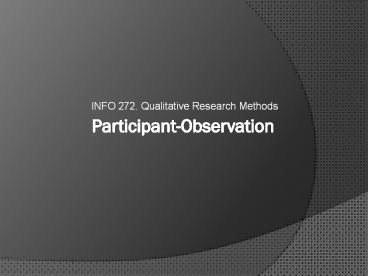Participant-Observation - PowerPoint PPT Presentation
Title:
Participant-Observation
Description:
... between direct quotes and paraphrasing '' for direct quotes and ' for ... the man was at a church event (New Years prayer service) and someone broke in to ... – PowerPoint PPT presentation
Number of Views:26
Avg rating:3.0/5.0
Title: Participant-Observation
1
Participant-Observation
- INFO 272. Qualitative Research Methods
2
Outline
- Observation
- Participation
- Recording (Field Notes)
- Ethics
3
Observation
- Evenly distributed attention
- Direct observation and description without
interpretation as a way to challenge conventional
thinking, discover new categories, concepts
Becker - When relying on observation alone be very careful
about imputing motives, general mind-reading.
4
Participation varying degrees
- going native at the extreme
- striking a balance between insider and outsider
- Researchers role as translator
5
Recording Note Taking
- when? as soon as possible
- where? somewhere unobtrusive
- what? a running description of events, people,
things heard and overheard, conversations among
people, conversations with people. Lofland
and Lofland - KEY IDEA Log more data than you know you will
need (to support an inductive analytical approach)
6
Recording best practices
separate direct observation from inference as best you can in brackets or in a separate column
distinguish between direct quotes and paraphrasing for direct quotes and for paraphrasing
all the specifics date, time, place names, names and contact info for people
certainly not limited to text drawings, maps, tape small papers into your notebook such as business cards, flyers, etc.
7
Jottings vs. full field notes
There are a series of testimonials. A young man
says he had a dream that some specific electronic
items in his room were stolen. As a result of
the dream he removed the items to another place.
The landlady told him she wasnt worried about
things being stolen. Then one night when the man
was at a church event (New Years prayer service)
and someone broke in to the place. The
landladys things were stolen and the things he
had moved were safe. It is pointed out in this
testimony that the landlady belonged to another
church a competitor. Second testimonial
things are going well with this young man. He is
being promoted at work, then a stranger comes
into the office and touches his rib. Afterwards
he falls ill and is sick for a few months. The
rib-toucher is described as a devil I see
allusions to witchcraft, sorcery someone who
wishes for the downfall of this young man, but he
recovers. Third testimonial girl wishes for
things in life to go to university (which she
does) to go on holiday to the UK (which she
does). travel abroad He calls up a woman from
the audience. He gives some sort of prophecy
about what will happen to her. She is very
emotional and screams out and keeps falling
backwards. The reverend comes towards here and
this force he is using pushes her backwards a
spiritual positive force (as opposed to the next
woman who is possessed by an evil force). ..
8
Ethics
- Respect for persons
- Beneficence
- Justice
9
Ethics Informed Consent
- People must be given the opportunity to choose
what shall or shall not happen to them. - What the research is about (in understandable
language) - The option to discontinue at any time
- No coercion
10
Ethics Anonymity
- protect identities, names, place names,
identifying features
11
Assignment 1
- Practice evenly distributing your attention
- Practice breaking down your observation into the
most basic descriptions (and distinguish this
from your interpretations) - Practice recording more data than you think is
relevant - Bonus points for approaching and engaging
strangers in your quest to understand the social
setting
12
Sites
- Oakland Public Library 6
- Parks/Plazas 6 ppl
- Farmers market 3 ppl
- Any depot, downtown bus depot 14th and Broadway
Bart byway - - Day laborers waiting to get picked up 4th street
and elsewhere - 3 - Thai temple in Berkeley food on Sundays -
- Flea market 8 ppl
- A mosque 5 ppl
- Points of commerce, bank ATMs -
- Grocery stores or Berkeley Bowl specifically - 8
- Restaurants - 1
- A gym, fitness RSF
- Albany Bulb - 1
- Dog parks - 1
- Sports bar, Super Bowl
- Parking lot before an event































